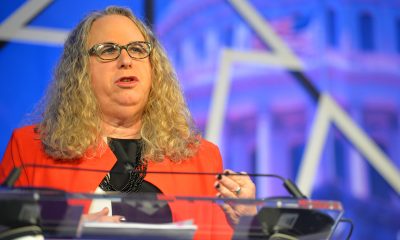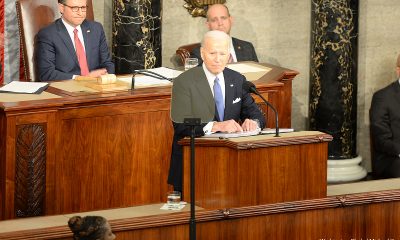The White House
Biden signs executive order to protect abortion access
U.S. Supreme Court struck down Roe v. Wade last month
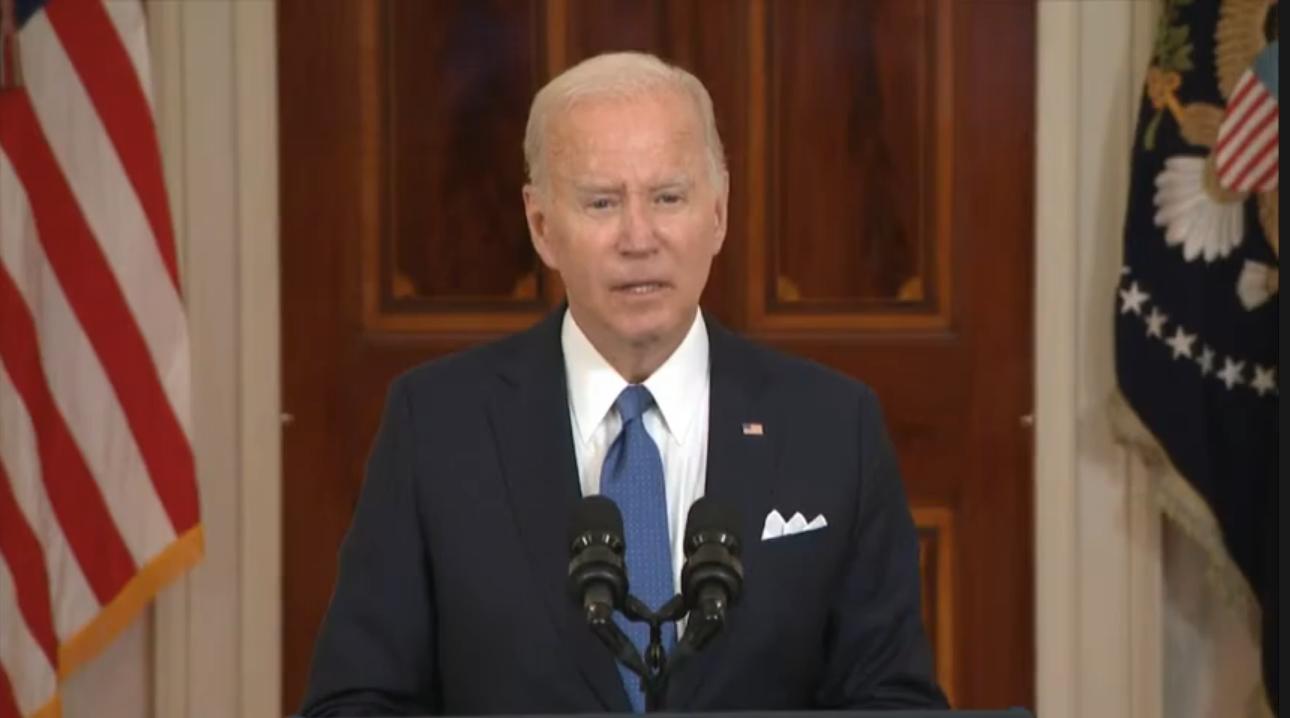
President Biden on Friday signed an executive order protecting access to reproductive health care services.
The president is under pressure from Democrats to step-up actions in the wake of the U.S. Supreme Court decision that overturned Roe v. Wade.
Biden made it clear that Congress needs to codify reproductive healthcare choices, however he also stated that he would continue to take actions on his own to to defend reproductive rights and protect access to safe and legal abortion.
Flanked by Vice President Kamala Harris and Health and Human Services Secretary Xavier Becerra in the Roosevelt Room, the president spoke about the order and the circumstances leading to the need for the executive order.
Biden referring to the Supreme Court ruling as “the wrong headed decision,” castigated the court for “playing fast and loose with the facts,” using the argument that abortion wasn’t rooted in historical precedent.
“The Supreme Court in Dobbs made a terrible, extreme and I think totally wrong-headed decision to overturn Roe v. Wade … This was not a decision driven by the Constitution […or] by history,” he said.
Biden then criticized the majority for reading the Constitution as frozen in the mindset of the 1800s, when women didn’t even have the right to vote.
Quoting the justice in dissent he then noted that the court decision was use of raw political power, saying that the court had finally a conservative majority to walk back the decision.
Biden urged that voters push out the Republicans in the upcoming mid-term elections labeling the Republicans as “extremist.” He then angrily cited the recent example of the 10-year-old rape victim in Ohio who was forced to travel to neighboring Indiana to have an abortion.
“Ten years old! … A 10 year old girl should be forced to give birth to a rapist’s child? What could be more extreme,” Biden said.
He warned that extremist Republicans even want to impose a national ban on abortion. As long as he’s president such a bill would be vetoed, he said.
The president also specified the need to have the Federal Trade Commission to regulate data brokers and others to enforce privacy for people using apps that expose them to the transfer and sales of sensitive health-related data.
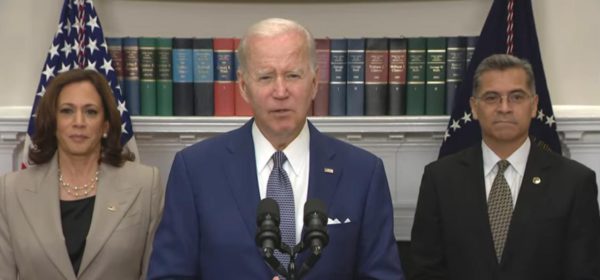
(Screenshot/YouTube White House Channel)
Biden then outlined that the Executive Order included:
- Safeguarding access to reproductive health care services, including abortion and contraception;
- Protecting the privacy of patients and their access to accurate information;
- Promoting the safety and security of patients, providers, and clinics; and
- Coordinating the implementation of Federal efforts to protect reproductive rights and access to health care.
The White House released the language of the executive order prior to Biden signing it:
The president has directed the secretary of Health and Human Services (HHS) to take the following actions and submit a report to him within 30 days on efforts to:
- Protect Access to Medication Abortion. HHS will take additional action to protect and expand access to abortion care, including access to medication that the FDA approved as safe and effective over 20 years ago. These actions will build on the steps the secretary of HHS has already taken at the president’s direction following the decision to ensure that medication abortion is as widely accessible as possible.
- Ensure Emergency Medical Care. HHS will take steps to ensure all patients – including pregnant women and those experiencing pregnancy loss – have access to the full rights and protections for emergency medical care afforded under the law, including by considering updates to current guidance that clarify physician responsibilities and protections under the Emergency Medical Treatment and Labor Act (EMTALA).
- Protect Access to Contraception. HHS will take additional actions to expand access to the full range of reproductive health services, including family planning services and providers, such as access to emergency contraception and long-acting reversible contraception like intrauterine devices (IUDs). In all 50 states and the District of Columbia, the Affordable Care Act guarantees coverage of women’s preventive services, including free birth control and contraceptive counseling, for individuals and covered dependents. The secretary of HHS has already directed the Centers for Medicare and Medicaid Services to take every legally available step to ensure patient access to family planning care and to protect family planning providers.
- Launch Outreach and Public Education Efforts. HHS will increase outreach and public education efforts regarding access to reproductive health care services — including abortion — to ensure that Americans have access to reliable and accurate information about their rights and access to care.
- Convene Volunteer Lawyers. The attorney general and the White House counsel will convene private pro bono attorneys, bar associations, and public interest organizations to encourage robust legal representation of patients, providers, and third parties lawfully seeking or offering reproductive health care services throughout the country. Such representation could include protecting the right to travel out of state to seek medical care. Immediately following the Supreme Court decision, the president announced his administration’s position that Americans must remain free to travel safely to another state to seek the care they need, as the attorney general made clear in his statement, and his commitment to fighting any attack by a state or local official who attempts to interfere with women exercising this right.
PROTECTING PATIENT PRIVACY AND ACCESS TO ACCURATE INFORMATION
The president’s executive order takes additional steps to protect patient privacy, including by addressing the transfer and sales of sensitive health-related data, combatting digital surveillance related to reproductive health care services, and protecting people seeking reproductive health care from inaccurate information, fraudulent schemes, or deceptive practices. The executive order will:
- Protect Consumers from Privacy Violations and Fraudulent and Deceptive Practices. The president has asked the chair of the Federal Trade Commission to consider taking steps to protect consumers’ privacy when seeking information about and provision of reproductive health care services. The president also has directed the secretary of HHS, in consultation with the attorney general and chair of the FTC, to consider options to address deceptive or fraudulent practices, including online, and protect access to accurate information.
- Protect Sensitive Health Information. HHS will consider additional actions, including under the Health Insurance Portability and Accountability Act (HIPAA), to better protect sensitive information related to reproductive health care. The secretary of HHS has already directed the HHS Office for Civil Rights to take initial steps to ensure patient privacy and nondiscrimination of patients, as well as providers who provide reproductive health care, including by:
- Issuing new guidance to address how the HIPAA Privacy Rule protects the privacy of individuals’ protected health information, including information related to reproductive health care. The guidance helps ensure doctors and other medical providers and health plans know that, with limited exceptions, they are not required – and in many cases, are not permitted – to disclose patients’ private information, including to law enforcement.
- Issuing a how-to guide for consumers on steps they can take to make sure they’re protecting their personal data on mobile apps.
- Issuing new guidance to address how the HIPAA Privacy Rule protects the privacy of individuals’ protected health information, including information related to reproductive health care. The guidance helps ensure doctors and other medical providers and health plans know that, with limited exceptions, they are not required – and in many cases, are not permitted – to disclose patients’ private information, including to law enforcement.
PROMOTING SAFETY AND SECURITY
The executive order addresses the heightened risk related to seeking and providing reproductive health care and will:
- Protect Patients, Providers and Clinics. The administration will ensure the safety of patients, providers, and third parties, and to protect the security of other entities that are providing, dispensing, or delivering reproductive health care services. This charge includes efforts to protect mobile clinics, which have been deployed to borders to offer care for out-of-state patients.
COORDINATING IMPLEMENTATION EFFORTS
To ensure the federal government takes a swift and coordinated approach to addressing reproductive rights and protecting access to reproductive health care, the president’s executive order will:
- Establish an Interagency Task Force. The president has directed HHS and the White House Gender Policy Council to establish and lead an interagency Task Force on Reproductive Health Care Access, responsible for coordinating federal interagency policymaking and program development. This task force will also include the attorney general. In addition, the attorney general will provide technical assistance to states affording legal protection to out-of-state patients as well as providers who offer legal reproductive health care.
EXECUTIVE ORDER BUILDS ON ADMINISTRATION’S ACTIONS TO PROTECT ACCESS TO REPRODUCTIVE HEALTH CARE
In addition to the actions announced today, the Biden-Harris administration has taken the following steps to protect access to reproductive health care and defend reproductive rights in the wake of the Supreme Court decision in Dobbs. On the day of the decision, the president strongly denounced the decision as an affront to women’s fundamental rights and the right to choose In addition to action mentioned above, the Biden-Harris administration is:
- Supporting Providers and Clinics. The secretary of HHS directed all HHS agencies to ensure that all HHS-funded providers and clinics have appropriate training and resources to handle family planning needs, and announced nearly $3 million in new funding to bolster training and technical assistance for the nationwide network of Title X family planning providers.
- Promoting Access to Accurate Information. On the day of the Supreme Court’s decision, HHS launched ReproductiveRights.gov, which provides timely and accurate information about reproductive rights and access to reproductive health care. This includes know-your-rights information for patients and providers and promoting awareness of and access to family planning services, as well as guidance for how to file a patient privacy or nondiscrimination complaint with its Office for Civil Rights.
- Providing Leave for Federal Workers Traveling for Medical Care. The Office of Personnel Management issued guidance affirming that paid sick leave can be taken to cover absences for travel to obtain reproductive health care.
- Protecting Access to Reproductive Health Care Services for Service members, DoD Civilians, and Military Families. The Department of Defense issued a memo to the Force, DoD civilians and military families on ensuring access to essential women’s health care services. The memo reiterates that the department will continue to provide seamless access to reproductive healthcare for military and civilian patients, as permitted by federal law. Military providers will continue to fulfill their duty to care for service members, military dependents and civilian personnel who require pregnancy termination in the cases of rape, incest, or to protect the life of the mother.
The White House
White House debuts action plan targeting pollutants in drinking water
Same-sex couples face higher risk from environmental hazards

Headlining an Earth Day event in Northern Virginia’s Prince William Forest on Monday, President Joe Biden announced the disbursement of $7 billion in new grants for solar projects and warned of his Republican opponent’s plans to roll back the progress his administration has made toward addressing the harms of climate change.
The administration has led more than 500 programs geared toward communities most impacted by health and safety hazards like pollution and extreme weather events.
In a statement to the Washington Blade on Wednesday, Brenda Mallory, chair of the White House Council on Environmental Quality, said, “President Biden is leading the most ambitious climate, conservation, and environmental justice agenda in history — and that means working toward a future where all people can breathe clean air, drink clean water, and live in a healthy community.”
“This Earth Week, the Biden-Harris Administration announced $7 billion in solar energy projects for over 900,000 households in disadvantaged communities while creating hundreds of thousands of clean energy jobs, which are being made more accessible by the American Climate Corps,” she said. “President Biden is delivering on his promise to help protect all communities from the impacts of climate change — including the LGBTQI+ community — and that we leave no community behind as we build an equitable and inclusive clean energy economy for all.”
Recent milestones in the administration’s climate policies include the U.S. Environmental Protection Agency’s issuance on April 10 of legally enforceable standard for detecting and treating drinking water contaminated with polyfluoroalkyl substances.
“This rule sets health safeguards and will require public water systems to monitor and reduce the levels of PFAS in our nation’s drinking water, and notify the public of any exceedances of those levels,” according to a White House fact sheet. “The rule sets drinking water limits for five individual PFAS, including the most frequently found PFOA and PFOS.”
The move is expected to protect 100 million Americans from exposure to the “forever chemicals,” which have been linked to severe health problems including cancers, liver and heart damage, and developmental impacts in children.
An interactive dashboard from the United States Geological Survey shows the concentrations of polyfluoroalkyl substances in tapwater are highest in urban areas with dense populations, including cities like New York and Los Angeles.
During Biden’s tenure, the federal government has launched more than 500 programs that are geared toward investing in the communities most impacted by climate change, whether the harms may arise from chemical pollutants, extreme weather events, or other causes.
New research by the Williams Institute at the UCLA School of Law found that because LGBTQ Americans are likelier to live in coastal areas and densely populated cities, households with same-sex couples are likelier to experience the adverse effects of climate change.
The report notes that previous research, including a study that used “national Census data on same-sex households by census tract combined with data on hazardous air pollutants (HAPs) from the National Air Toxics Assessment” to model “the relationship between same-sex households and risk of cancer and respiratory illness” found “that higher prevalence of same-sex households is associated with higher risks for these diseases.”
“Climate change action plans at federal, state, and local levels, including disaster preparedness, response, and recovery plans, must be inclusive and address the specific needs and vulnerabilities facing LGBT people,” the Williams Institute wrote.
With respect to polyfluoroalkyl substances, the EPA’s adoption of new standards follows other federal actions undertaken during the Biden-Harris administration to protect firefighters and healthcare workers, test for and clean up pollution, and phase out or reduce use of the chemicals in fire suppressants, food packaging, and federal procurement.
The White House
Francisco Ruiz appointed director of White House Office of National AIDS Policy
Former CDC official is first Latino to run office
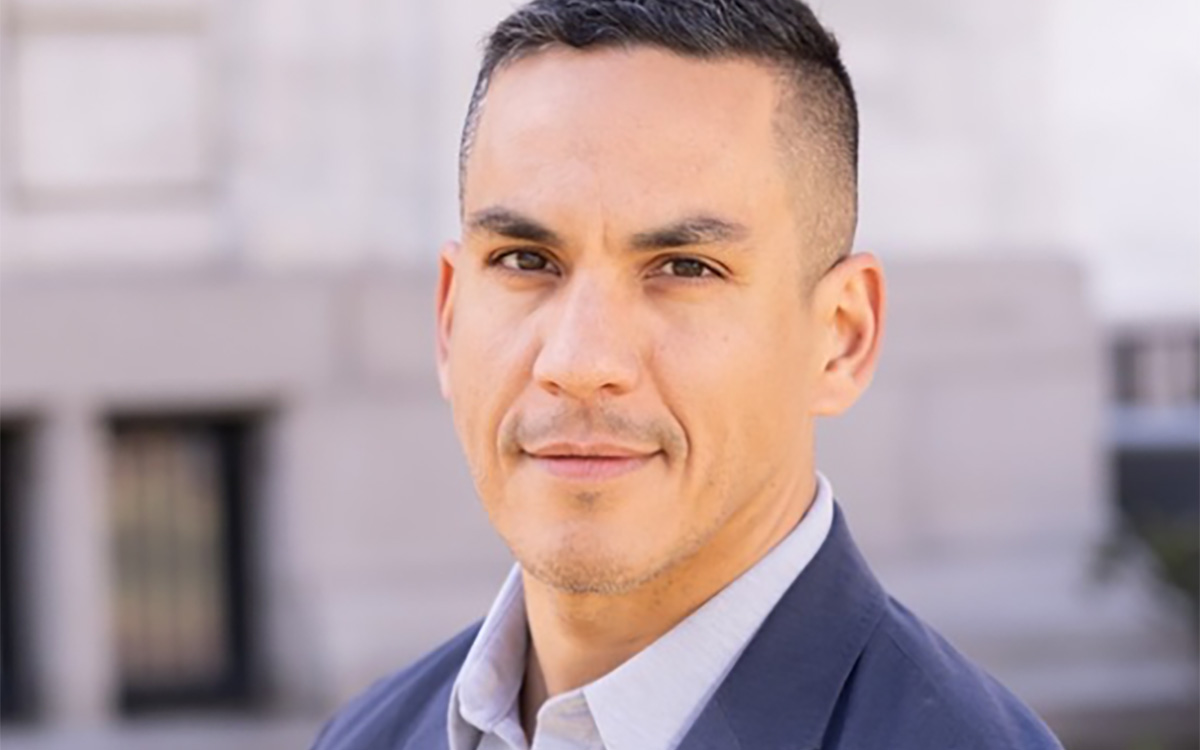
Francisco Ruiz’s appointment as the director of the White House Office of National AIDS Policy has elicited widespread acknowledgment across various sectors.
Ruiz, a distinguished figure in public health with a history of collaboration and strategic partnerships, assumes the role as the first-ever Latino to serve as ONAP’s director, underscoring a commitment to diversity and inclusivity in addressing public health challenges.
In response to his appointment, Domestic Policy Advisor Neera Tanden underscored the Biden-Harris administration’s steadfast commitment to ending the HIV epidemic and enhancing the quality of life for people living with HIV. Ruiz himself acknowledged this sentiment, emphasizing that accelerating efforts to combat the HIV epidemic and improve the well-being of those affected remain a paramount public health priority for the White House.
Previously serving at the U.S. Centers for Disease Control and Prevention, Ruiz played a pivotal role in advancing national HIV prevention campaigns, particularly contributing to the goals of the Ending the HIV Epidemic in the U.S. Initiative. His experience in fostering strategic partnerships and ensuring sensitive prevention messaging has been noted as instrumental in reaching diverse communities across the country and in U.S. territories.
Ruiz in his new role will be tasked with accelerating efforts to end the HIV epidemic and improve the quality of life for people living with HIV.
Guillermo Chacón, president of the Latino Commission on AIDS and founder of the Hispanic Health Network, expressed confidence in Ruiz’s ability to advance the national strategy to end the HIV epidemic.
“Mr. Ruiz is a respected public health leader and a fitting choice to ensure that the Biden-Harris administration meets the goal of ending the HIV epidemic in the United States and U.S. Territories,” said Chacón.
“Francisco Ruiz’s appointment signifies a renewed focus on addressing health disparities and promoting health equity, particularly for historically marginalized and underserved communities,” he added. “As a person living with HIV and the son of Mexican immigrants, Ruiz brings personal insight and professional expertise to his new role, ensuring that strategies to combat HIV/AIDS are scientifically grounded and connected with the experiences of those most affected.”
The White House
White House, officials condemn Ugandan court’s Anti-Homosexuality Act ruling
Biden-Harris administration has sanctioned country over law

During a briefing on Wednesday, White House Press Secretary Karine Jean-Pierre condemned the ruling issued hours earlier by a court in Uganda that upheld the East African country’s Anti-Homosexuality Act, a law that contains a death penalty provision for “aggravated homosexuality.”
“The announcement that some provisions of Uganda’s Anti-Homosexuality Act have been removed by the Constitutional Court is a small and insufficient step towards safeguarding human rights,” Jean-Pierre said.
The press secretary continued, “The United States is deeply concerned about the remaining provisions which undermine public health, human rights and Uganda’s international reputation.”
She added, “As the president has said time and time again, no one should have to live in constant fear nor be subjected to violence or discrimination. It is wrong. We will continue to work to advance respect for human rights for all in Uganda and also around the world.”
After the Anti-Homosexuality Act was signed into law last May, the U.S. implemented visa restrictions on Ugandan officials and excluded the country from a program allowing sub-Saharan African countries to trade with the U.S. duty-free.
As detailed by a White House fact sheet issued in December, the U.S. also imposed sanctions and reduced government support of Uganda including through “new restrictions and redirections of impacted assistance, including through the Department of Defense and the President’s Emergency Plan for AIDS Relief (PEPFAR)” and “pausing approximately $15 million for all biological threat reductions activities with the Ugandan Ministries of Health, Agriculture and Tourism.”
The statement notes more than $5 million in PEPFAR funding will be redirected “to non-governmental implementing partners due to concerns over how the AHA impacts the Government of Uganda’s ability to deliver services in a non-discriminatory manner.”
Other actions include issuance of travel and business advisories targeting Uganda, and supporting “victims of the AHA” which “may include assistance for those who are victims of violence, evicted from their homes or who need help accessing medical care” and legal aid for those who are “unjustly arrested.”
Jean-Pierre’s remarks on Wednesday echoed those contained in a statement by a coalition of Ugandan LGBTQ groups, which noted that the court found “some sections” of the law in violation of “the right to health, right to privacy and right to freedom of religion,” but likewise argued the ruling “failed to identify the numerous ways the law violates Ugandans’ substantive rights to equality, dignity, speech, association and health and freedom from discrimination.“
Human Rights Campaign President Kelley Robinson also condemned the decision.
“For the Constitutional Court of Uganda to uphold such a draconian law in any capacity is a horrific display of hatred that will mean further discrimination and physical harm for LGBTQ+ Ugandans,” she said.
Secretary of State Antony Blinken on Wednesday also criticized the ruling.
“The United States continues to be deeply concerned by reports of human rights abuses in Uganda, including against the LGBTQI+ community. The announcement that some provisions of the Anti-Homosexuality Act have been removed by the Constitutional Court is a small and insufficient step towards safeguarding human rights,” he said in a statement. “The remaining provisions of the AHA pose grave threats to the Ugandan people, especially LGBTQI+ Ugandans and their allies, undermine public health, clamp down on civic space, damage Uganda’s international reputation and harm efforts to increase foreign investment.”
“Uganda should respect the human dignity of all and provide equal protection to all individuals under the law,” added Blinken.
On Thursday, National Security Advisor Jake Sullivan released a statement calling the ruling “deeply disappointing,” arguing that it “imperils human rights” and “jeopardizes economic prosperity for all Ugandans.”
“The Court has left LGBTQI+ persons vulnerable to hate-fueled violence, discrimination, persecution, life imprisonment, or even the death penalty – simply for existing as they are,” Sullivan said.
“The United States will continue to hold accountable individuals and entities that perpetrate human rights abuses in Uganda, both unilaterally and with partners around the world,” he said, adding that “Yesterday’s ruling is a missed opportunity for Uganda—not only to uphold the human rights of all Ugandans, but also to reaffirm the importance of dignity, compassion, and tolerance for all.”
Michael K. Lavers contributed to this story.
-

 State Department3 days ago
State Department3 days agoState Department releases annual human rights report
-

 Maryland4 days ago
Maryland4 days agoJoe Vogel campaign holds ‘Big Gay Canvass Kickoff’
-

 Politics3 days ago
Politics3 days agoSmithsonian staff concerned about future of LGBTQ programming amid GOP scrutiny
-

 The White House2 days ago
The White House2 days agoWhite House debuts action plan targeting pollutants in drinking water

